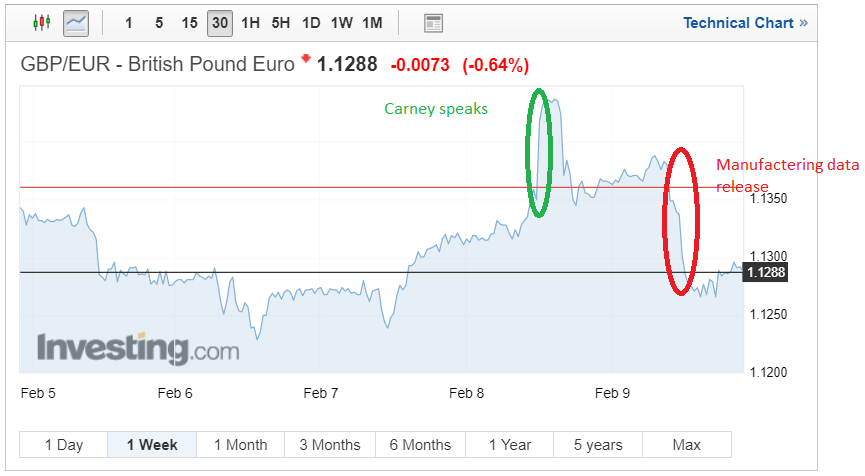Pound sterling movement was provoked by a number of significant elements this week. The main instigators of the pound sterling movement included continual Brexit hearsay, the latest Bank of England statement and below par manufacturing figures. This weekend has also seen the leaked publication of the potential effects of Brexit on the economy which will almost certainly attribute to pound sterling falling further when trade begins in Asia later tonight.

Brexit speculation
As the UK contingent returned to Brussels this week many hoped that the second round of negotiations would offer some levels of support to pound sterling in the same modest manner as the conclusion of the first round did. However, the run-up to this week’s talks was marred by uncertainty and backbiting in the conservative party and speculation surround Theresa May’s job security was growing as the Brexit team departed for Brussels.
The first topic of conversation was Brexit’s transition period which appears to be a real point of conflict. This has seen the relationship that was debatably rekindled at the final stage of the first negotiation talks sour significantly. Michel Barnier and David Davis appeared to be at odds with Barnier stating that Davis was unable to attend a key meeting with Davis claiming that the meeting went ahead in the afternoon.
The points of contention between the UK’s and the EU’s understanding of the transition period include –
- New EU rules/ Law –The UK’s ability veto new rules set out by the European Union during the transition period
- Immigration/ Free movement – Immigration to the UK had been a huge vote winner during the referendum. The UK’s wish to control the flow of immigration during the transition period.
- Current and new Policies – The UK wants to reserve the right to cherry pick policies which it adheres to.
Following this week’s round of negotiations, Barnier participated in a solo press conference, which typically would have been attended by both parties. Addressing the press conference alone Barnier stated.
“I have some problems understanding the UK’s position: they themselves asked for this transition period, the heads of state and government said yes on the basis of very logical conditions – because you’re keeping the single market, customs union, the economic status quo for a limited period, it’s understandable that we should keep the regulatory and supervision structure, the way rules are applied, it’s the integrity of the single market that’s at stake.’’
Whilst David Davis has refuted the claims that the meeting didn’t take place the clear gaping divide between the UK and EU and the vulnerable position Theresa May finds herself in are driving pound sterling down.
Mark Carney speaks
Thursday brought the release of a raft of information from the bank of England this included, UK inflation report which is released quarterly. The monthly vote on interest rates and an accompanying speech covered both.
In recent weeks Carney painted a much more positive outlook for the UK economy and stated that the BOE anticipated that growth would improve.
Markets had expected a less hawkish tone from the bank of England governor following the raft of disappointing economic data.
Governor Carney’s outlook continued to be held up by the improving global economy, modest UK growth and inflationary pressures which he believes could lead to UK wage growth. He highlighted that the need for UK interest rate rises may come sooner than anticipated in the last quarter. Providing a longer-term view, Carney forecasts interest rates to increase to 1.2% by 2021 eluding to three potential rate hikes in the coming years. Carney also stated that rate rises may be larger than previously expected.
Concerns still circle around the UK’s high inflation rate which sits at 3.1%; addressing this Carney illustrated that he thought that inflation rates would gradually subside over the three-year forecast. Nevertheless, the bank of England expects inflation levels to remain high over the coming months due to domestic costs, energy prices rebounding and elevated import cost due to the weaker pound sterling.
January’s UK Manufacturing output
Just a day after the release of inflation reports and the BOE rate decision, markets awaited the latest UK manufacturing figures. In light of Carney’s rhetoric investors may have anticipated a number in excess of the forecast 0.3%, however as has many times been the case the number fell slightly short up of the build-up and the UK manufacturing only met the target.
In recent months manufacturing figures have excelled achieving overestimate in 5 out of the last 6 readings. The data provided a sobering conclusion to the week and triggering a further pound sterling sell-off.
The true impact of a no deal Brexit?
With almost perfect timing a report has also been leaked in the last few days highlighting the implications of Brexit. The report which highlighted that the UK could forego £252 billion over 15 years if the UK was to opt for a ‘No deal’ outcome.
A deal whereby the UK retained a free trade agreement was slightly less damaging but resulted in the UK economy losing £131 Billion over the same time period.
Whilst an EU referendum U-turn saw the UK remain in the single market and the customs union would equate to a loss of £52 Billion.
Revenue from taxation was also dramatically reduced. The report demonstrated a UK tax revenue loss of £82.4Bn in the event of a no deal outcome, £42.7 Billion if a trade deal was negotiated and a £17.1 Billion loss if a soft Brexit deal was executed. All tax revenue calculations were also formulated over a 15 year time period.
Pound sterling performance against the US Dollar and Euro
In the days leading up to the UK interest rate decision, inflation report and the concluding speech Pound sterling – US Dollar slipped towards a three-week low touching 1.3857. Pound to Euro rates reacted in a similar fashion in the days before the announcement with GBP/EUR slipping to 1.1239.
Many had anticipated a more sedate tone from the BOE and Marc Carney, however, his quarterly economic overview propelled GBP/EUR to 1.1435; levels which were only held for a short period of time. Manufacturing data ensured pound sterling short-term gains were compounded and GBP concluded the trading week at 1.1288.
GB Pound to US Dollar reacted in a similar fashion arguably less dramatically where GB pound to US Dollar spiked to a 1.4059 following Carney’s overview and falling to a week low of 1.3771 a few hours before the week close.
